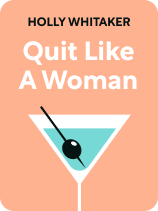

This article is an excerpt from the Shortform book guide to "Quit Like a Woman" by Holly Whitaker. Shortform has the world's best summaries and analyses of books you should be reading.
Like this article? Sign up for a free trial here.
How do you have healthy relationships in recovery? How important is it to connect with people in sobriety?
In Quit Like a Woman, Holly Whitaker claims that part of your recovery journey is learning how to deal effectively with others. Navigating relationships as a newly sober person can be difficult because many of them will change now that you’re no longer drinking.
Here are some ways Whitaker recommends dealing with new and old relationships in recovery.
View Every Relationship and Interaction as a Learning Opportunity
The first way to have healthy relationships in recovery is to view everyone you encounter along your sobriety journey as a teacher helping you grow, recommends Whitaker. In this way, you can frame difficult people and situations not as obstacles to your happiness, but rather as enablers of your future happiness because they alert you to what you will and won’t tolerate.
(Shortform note: In The Untethered Soul, Michael A. Singer takes Whitaker’s idea of viewing unpleasant people as teachers even further: He claims that when you decide to be happy—which we can see as akin to embarking on a path of recovery—life will actively test your resolve by throwing obstacles in your path. This means life might intentionally make you meet people who try your patience.)
Give Yourself Permission to Change
When you become sober, you’re allowed to change in other, broader ways, assures Whitaker. You don’t owe it to anyone to remain the same person or to continue participating in activities you no longer enjoy. This might mean you lose some of the friends with whom drinking was your main shared activity and other friends who simply can’t be part of your journey—that’s okay. You’ll make new friends, as we’ll discuss next.
Create a Strong Support Network
While Whitaker touts the virtues of spending time alone to get in tune with yourself, she also notes that it’s critical to establish a strong support network because all humans need community and close connections. This should consist of several types of supporters: advisors (mentors, teachers, therapists), other sober people, and intimate friends.
She stipulates that you don’t need a huge support network and indeed warns against feeling that your worth is measured by how many friends you have. However, you must resist the urge to fully isolate yourself during recovery because you believe you need time alone to get back in touch with yourself. While reconnecting with yourself is important, being alone all the time isn’t sustainable or healthy.
Whitaker offers recommendations for how to find new friends in your sobriety: Seek out sober events, workshops, retreats, meetings, and personalities on social media. Additionally, make new friends whose interests and life goals align with yours (for instance, through volunteerism or activism).
No matter what, you must take risks to get out there, and it will probably be hard. Be patient: You will eventually find a group of supporters.
Whitaker’s Recovery Approach and Buddhism
Whitaker’s recommendations to let yourself change and create a support network draw heavily on Buddhist thought. In The Art of Happiness, the Dalai Lama describes some of the concepts Whitaker seems to be using. Let’s look at these and highlight the key differences.
Acceptance of Change: The Dalai Lama stresses that to eliminate suffering, you must accept change. However, he focuses more on the acceptance of events around you—death, loss, shifting circumstances—while Whitaker’s advice relates more to your internal states—your preferences and needs. The external changes she mentions (the loss of certain friends, for instance) are merely outcomes of your internal changes, so she focuses more on that internal change.
Support Networks: The Dalai Lama claims, like Whitaker, that all humans need to feel connected to others to be happy. However, he advises establishing many close connections with people from different realms of your life. These can give you different types of support (whereas having only one type of connection—a spouse, for instance—can only give you one type of support). While Whitaker also advises finding different types of supporters, she doesn’t stress quantity as much as the Dalai Lama, who feels you should establish connections as often as possible.
Further, Whitaker provides specific advice on where to seek new friends, but the Dalai Lama feels you can turn virtually anyone into a friend simply by being empathetic and approaching them with compassion. If you can do this, then perhaps making friends won’t be as difficult or take as long as Whitaker suggests it will.

———End of Preview———
Like what you just read? Read the rest of the world's best book summary and analysis of Holly Whitaker's "Quit Like a Woman" at Shortform.
Here's what you'll find in our full Quit Like a Woman summary:
- Why society misunderstands what alcohol addiction is, what causes it, and how to treat it
- Why alcohol is always bad for you, even in moderation
- A feminine, holistic approach to recovery and sobriety






